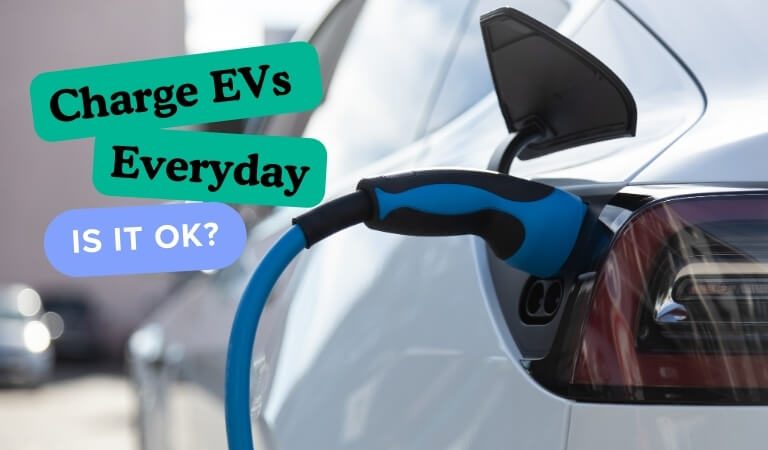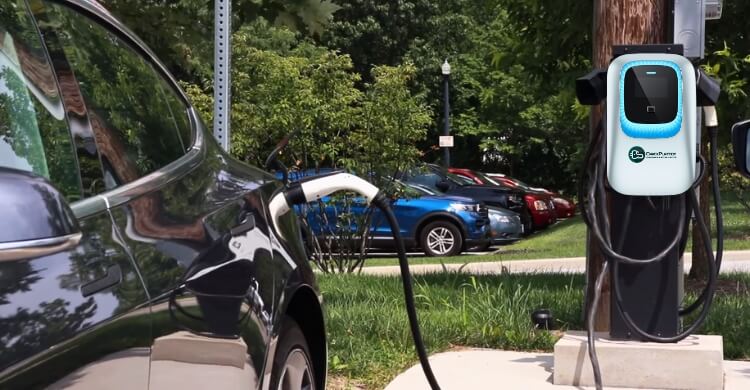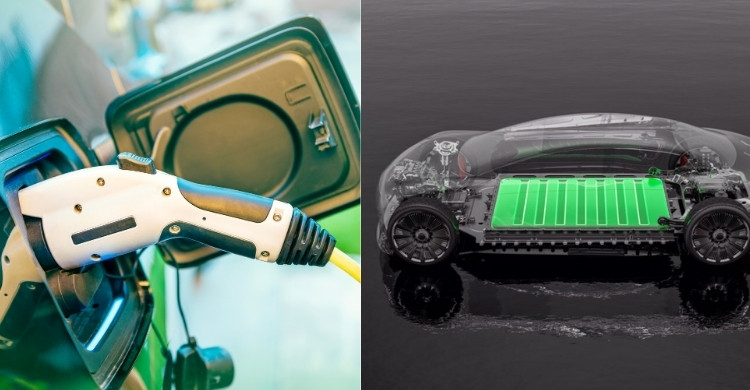Electric vehicles (EVs) are revolutionizing the way we think about transportation, offering eco-friendly and cost-effective alternatives to traditional vehicles. One of the common concerns for new EV owners is whether daily charging is harmful to the vehicle’s battery. So, is it ok to charge EV every day?
Yes, it is generally okay to charge your EV every day, especially if using a Level 1 or 2 charger. Modern EVs are equipped with advanced battery management systems that prevent overcharging, which keeps the battery healthy even when it’s recharged every day.
With this in mind, you can confidently charge your EV regularly without worrying about battery damage. Read on to learn more about the best charging practices for your electric vehicle.
Is it Ok to Charge EV Every Day?
Yes, it is okay to charge your EV every day. Charging daily helps keep your battery ready for regular driving needs. Most people plug in their electric car at night, just like charging a phone. This routine works well and keeps things simple for everyday use.
Electric cars today come with smart battery systems that stop charging when the battery is full. This helps protect the battery from damage, even with daily charging. Using Level 1 or Level 2 chargers at home makes the process easy and safe. These chargers are designed to work slowly, which is better for battery health.

As electric vehicle charging stations in Bangladesh, or any other South Asian developing country, become more widespread, daily charging is becoming even easier for drivers. With more public and private charging points available, keeping your EV charged and ready for use is less of a hassle. Whether using home chargers or charging at stations, daily charging offers a smooth experience.
While daily charging is fine, it’s still good to avoid charging to 100% every single time unless you need the full range. Keeping the charge between 20% and 80% helps your battery last longer. Also, fast charging every day may wear the battery faster over time. So, regular home charging is usually the best way to go.
When is the Best Time to Plug in Your EV?
Electric vehicles (EVs) may seem simple to charge, but timing can impact battery life and energy efficiency. You can get the most out of your EV by knowing when to charge it. Below are some suggestions to help you decide when to plug in your EV.
Late Evening Is Ideal for Home Charging
After dinner or before bed is a good time to plug in your EV at home for an overnight charge. Your battery charges slowly and safely while you sleep, reducing heat and wear. This habit also avoids busy usage times when electricity demand is highest. Home charging at night is both easy and cost-effective for most drivers.
Avoid Charging During Peak Electricity Hours
Peak hours are usually in the morning and early evening when everyone uses appliances, lights, and heating or cooling systems. Charging during this time costs more and can overload local power systems. It’s also not great for the environment since more fossil fuels may be used. Waiting until off-peak hours makes your charging cleaner and cheaper.
Use Timers for Automatic Charging
Most EVs and chargers have timers to start charging at a set time without you needing to plug in manually. Set it to begin charging during the night or early morning when power is cheaper. This feature helps you save time and build a regular charging habit. Timers make EV charging easier, smarter, and more convenient every day.
Charging During Off-Peak Hours
Electricity is cheaper during off-peak hours, usually at night when fewer people use power across homes and businesses. Managing the charging frequency for electric vehicles during these hours helps reduce costs and supports better energy use. Many energy companies offer special rates for night-time charging to encourage this practice. It’s a smart way to cut energy costs while using your EV.
Consider Weather and Temperature
Cold weather slows down charging, and very hot days can heat the battery too much while charging. Mild evening or early morning temperatures are better for charging. This keeps the battery healthy and improves charging efficiency. Always try to charge in cooler times when possible, especially during summer or winter.
Public Charging Works Best Midday
Public charging stations are less busy during mid-morning or early afternoon, avoiding long waits and busy traffic times. Many drivers charge during lunch breaks while running errands. Midday also gives enough time to recharge before evening travel needs. Picking less crowded times makes public charging faster and more relaxed.
Do Different EV Models React Differently to Frequent Charging?
Yes, different EV models can react differently to frequent charging based on battery type, design, and charging technology used. Each model comes with its own battery management system that controls how charging affects battery health. Some systems are more advanced and can better handle regular daily charging without damage. This makes a big difference in how long the battery lasts over time.
Battery chemistry also plays a strong role in how an EV reacts to frequent charging routines across different brands and models. For example, some batteries handle heat better, which helps reduce wear from regular charging. Others may degrade faster if charged to full often or left plugged in for too long. That’s why following the manual and charging tips for your model is always smart.
Older EVs may not perform as well with daily charging compared to newer models built with smarter charging protections. Newer vehicles often limit charging speeds when the battery is full, avoiding overcharging. Some even allow setting charge limits, which helps keep the battery in better shape. That’s why it’s important to know what features your EV offers for safer, daily use.
Even though most EVs can handle regular charging, habits should still be adjusted to match your car’s specific needs and usage style. Checking how your model manages charging helps extend battery life and reduce long-term issues. Charging slowly and not always to 100% are good habits for almost all EVs. These steps make sure your EV stays reliable and efficient for years.
Which EV Charger Type is Best for Nightly Recharging?
Charging your EV overnight is an easy way to ensure it’s ready for the next day. The right charger type can make nightly recharging more convenient and efficient. Let’s take a closer look at which options are best for you.

Level 1 Chargers
Level 1 chargers come with most EVs and plug into a regular home wall socket without needing extra equipment or setup. Some of the level 1 EV charger features include ease of use, slow charging speed, and compatibility with standard household outlets. This type works best for short daily drives, topping off your battery slowly over several hours. Many users prefer it for its ease and no-installation benefit, especially in small homes or apartments.
If you’re not driving long distances daily, Level 1 charging usually provides enough power for your needs. It’s also safer for battery life because it charges at a low speed. Slow charging reduces heat buildup, which helps protect the battery over time. For most people, this method meets everyday needs without added cost or effort.
Level 2 Chargers
Level 2 chargers need a dedicated outlet but offer faster charging than Level 1, making them ideal for drivers with longer commutes. This type can fully charge most EVs overnight in just a few hours while you rest. They’re often installed in garages or driveways for easy and regular nighttime use. More power means more flexibility when you need to charge quickly and drive more each day.
Many EV owners upgrade to Level 2 chargers when they want faster, dependable charging without using public stations all the time. These chargers are safe, efficient, and well-suited for nightly charging in most homes. They also support features like timers and charge limit settings, which help protect your battery. Investing in a Level 2 charger adds convenience and saves time for busy households.
How to Maintain EV Battery Life With Frequent Recharges?
Keeping your EV battery healthy is important, especially if you charge it often. A few simple habits can make a big difference. Here are some easy tips to help your EV battery last longer, even with daily recharging.

Don’t Always Charge to 100%
Charging to full daily can slowly reduce your battery’s health over time. Most EVs perform better when charged to around 80%. This helps reduce battery stress and supports longer life. Use charging limit settings in your vehicle if they are available.
Avoid Letting Battery Drop to 0%
Running the battery down to empty can damage the internal cells over time. Try to keep your charge above 20% daily. It’s okay if it happens once, but not too often. Low battery levels should be avoided when possible for better health.
Use Level 1 or Level 2 Chargers
Fast charging creates more heat, which can harm battery health if used too often. Regular charging with Level 1 or 2 is safer. These slower chargers are better for everyday use and long-term battery care. Save fast charging for long trips or emergencies.
Keep Battery Cool and Protected
Batteries work best when they’re not too hot or too cold. Try parking in shaded areas during very hot days. In winter, indoor parking helps maintain better battery temperatures. Avoid direct sunlight and extreme cold when possible for improved battery performance.
Plan Charging Based on Driving Needs
Charge your EV based on how far you plan to drive that day. Don’t charge more than needed if staying local. Charging less for short trips helps reduce battery wear. Always plan ahead to balance usage and battery care properly.
Monitor Charging Habits Regularly
Check your charging pattern every few weeks to see when it needs changes. Many EV apps show battery health and charging history. Keeping track helps you spot any problems early on. Good habits and regular checks lead to longer battery life.
FAQs About Is it Ok to Charge EV Every Day?
While the main article covers many key points about charging your EV every day, some specific questions often come up from everyday EV users. Below, we’ve gathered helpful answers to frequently asked questions that go beyond the basics.
Should I Plug in My EV Even if It’s Half Charged?
Yes, it’s safe to plug in your EV even when it’s not empty. Most EVs are designed to handle partial charging. The battery management system ensures charging stops when it’s full, avoiding damage. This makes topping off your battery during the day perfectly fine.
Do Frequent Short Charges Hurt the Battery?
Short, frequent charging sessions are not harmful if you’re not consistently charging to 100%. Topping up as needed helps maintain readiness. Just ensure you don’t fast-charge too often or store your EV at full charge. These habits reduce battery strain over time.
Does Daily Charging Change My EV’s Warranty Coverage?
Most manufacturers allow for daily charging within normal usage and won’t void the warranty. However, always read your EV’s manual for details. Some brands recommend specific practices for battery care that support warranty protection. Following those helps keep your battery and warranty safe.
Should I Worry About Energy Loss During Frequent Charging?
Energy loss during charging is minimal when using efficient chargers. While fast chargers may waste more energy as heat, Level 1 or 2 chargers are better. They maintain battery health and avoid unnecessary energy loss. Charging smartly is both eco-friendly and cost-effective.
Can I Use a Portable Charger for Daily EV Charging?
Yes, you can use a portable charger daily, but ensure it’s certified and works with your EV model. Portable chargers are handy for regular use if you don’t have a home station. Just avoid over-reliance on them during extreme weather or long trips. Always follow the manufacturer’s recommendations for best results.
Is Smart Charging Better Than Manual Charging for Daily Use?
Smart charging helps schedule your charging during off-peak hours and avoids charging when the battery is already full. It’s ideal for daily use because it reduces strain. Many EVs support smart charging through built-in systems or apps. Using smart features boosts convenience and battery safety.
How Does My Driving Pattern Affect Daily Charging Needs?
Driving patterns heavily influence how often you should charge. Daily short trips may only require a partial charge, while long commutes need a full ones. Understanding your average daily usage helps avoid unnecessary charging. Efficient planning extends your battery life and keeps charging habits balanced.
What Role Does Regenerative Braking Play in Battery Usage?
Regenerative braking returns some energy to the battery, reducing how often you need to charge. It’s helpful for city driving with frequent stops. While it doesn’t replace charging, it supports better energy use. Using regen braking wisely can slightly extend battery range and reduce strain.
Bottom Line
Charging your EV daily is a simple habit that many drivers already follow, and it’s completely safe if you follow the right approach. During frequent recharging, modern electric vehicles have smart systems that protect the battery. By understanding your charger type, setting limits, and avoiding extreme battery levels, you can make a big difference.
So, is it Ok to charge EV every day? Yes, especially if you use Level 1 or Level 2 chargers and follow good practices like avoiding full charges too often. Charging at night, during off-peak hours, and based on your driving routine helps both your wallet and your battery. Each EV model may respond differently, so knowing your vehicle matters. With care and awareness, daily charging can support a long-lasting, reliable EV experience.
